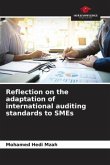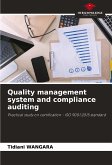The current need and requirement to generate certified information, typical of a globalized system, demands evaluations and dynamic controls based on auditing, not because it is a regulatory and legal requirement in the public and private sector, but because it leads to correct, feedback, consolidate and improve information for strategic decision making that drives organizational competitiveness and promotes principles of reliability, transparency and quality of financial, administrative and management information.The structure of the academic work by its content is of relevant character, foreseen of an induction to the thematic and conceptual foundation of the financial audit of its phases of Planning, Execution of the Work and Communication of Results; thus complying with the doctrinal and normative principles established in the NAGA, NIA and the NICC that validate the analysis and evaluation of the residual risk related to the integrity of the implemented controls; as well as,system of financial and management execution that will allow establishing an opinion on the financial reasonableness.
Bitte wählen Sie Ihr Anliegen aus.
Rechnungen
Retourenschein anfordern
Bestellstatus
Storno








